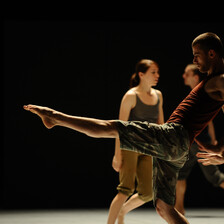The Electronic Intifada 24 November 2008
The Batsheva Dance Company of Tel Aviv is touring the US and Canada in January, February, and March, 2009. A recipient of public financing since the 1990s, the dance troupe is clearly an Israeli apartheid cultural institution. Writing October 26, 2008, in The Independent of London, Jenny Gilbert reports that the dance company is “funded by Israel’s government, its performers include none of Arab extraction, and it is ‘proud to be considered Israel’s leading ambassador.’”
Ohad Naharin, the dance company’s current Director, served in the Israeli army. In a 2005 interview with a Canadian newspaper, Naharin stated that “I continue to do my work, while 20 km from me people are participating in war crimes … the ability to detach oneself from the situation — that is what allows one to go on.” Needless to say, the victims of Israeli “war crimes” cannot avail themselves of the luxury of detachment.
In the summer of 2006, Israel turned Lebanon into a free-fire zone and killed over a thousand Lebanese civilians and wounded thousands more. Just a few weeks later, in October 2006, Dance Magazine asked Naharin: “How does the current conflict between Israel and Lebanon affect you as an artist?” He responded that “I don’t separate my artistry from my life. My life and my work is all one thing. I’m affected by what’s going on, of course.” Later in the same interview Naharin noted, “We have two Israeli soldiers in our junior company.” and “I don’t like that people think Israel: war, guns, army.”
A 1998 Dance Magazine article recounts that the Batsheva Dance Company was founded 1964 by Baroness Batsheva de Rothschild, a scion of the wealthy international banking family. Grand uncle Edmond James de Rothschild and his son, James Armand, bankrolled Jewish colonization of Palestine “with a lavish munificence” starting in the late 1800s. First cousin once removed Lionel Walter is the “Lord Rothschild” to whom the infamous Balfour Declaration — committing the British government to “view with favor the establishment in Palestine of a national home for the Jewish people” — is addressed.
According to a profile of Batsheva de Rothschild on the web site of the Jewish Agency for Israel, she “was born in London in 1914” and “grew up in Paris” nevertheless she settled in Israel in 1958 or the 1960s (accounts vary). The 1998 Dance Magazine story reports Rothschild “served in Israel as a driver when her car was mobilized for the Yom Kippur War of 1973” and supported Jewish colonization of Palestine by providing “housing for newcomers in the early 1950s.”
To return to the Gilbert article, she reports that at a London performance this fall by the dance company, “protesters tried to persuade customers to boycott the show.” Early next year, human rights activists will have an opportunity to follow their fine example and demonstrate solidarity with the Palestinian people by honoring their requests for boycotts of Israel. The 2004 Palestinian Call for the Academic and Cultural Boycott of Israel called “upon our colleagues in the international community to comprehensively and consistently boycott all Israeli academic and cultural institutions as a contribution to the struggle to end Israel’s occupation, colonization and system of apartheid.” In 2005, 171 “Palestinian political parties, unions, associations, coalitions and organizations” representing “Palestinian refugees, Palestinians under occupation and Palestinian citizens of Israel” urged “international civil society organizations and people of conscience all over the world to impose broad boycotts and implement divestment initiatives against Israel similar to those applied to South Africa in the apartheid era.”
It is a testimony to how seriously Israelis take the international Boycott, Divestment and Sanctions (BDS) movement that one of the country’s leading media outlets would cover the story of a related protest against the Jerusalem Symphony Orchestra in Ann Arbor, MI, a day before it happened. On 15 November 2008, Ynet, the online version of the Yedioth Ahronoth, published “Pro-Palestinian group: Cancel Jerusalem Symphony Orchestra’s Michigan concert.” Critics of the BDS movement like to downplay its significance and “effectiveness” but the growing significance and effectiveness of this nonviolent movement is exactly what most terrifies Zionists and their allies and also explains why efforts such as the one in Ann Arbor cannot be completely ignored by the Israeli media or American Zionists.
Omar Barghouti recently wrote that “pragmatically speaking, the BDS process has proved over the past few years that it is among the most effective forms of civil, non-violent Palestinian resistance to Israeli colonial and apartheid regime.” It is imperative that those working for justice in Palestine start organizing now to persuade those hosting the Batsheva Dance Company to cancel the upcoming performances.
The Batsheva Dance Company is currently scheduled to perform in Houston, TX; Purchase, NY; Princeton, NJ; Philadelphia, PA; Pittsburgh, PA; Chicago, IL; Columbus, OH; Ottawa, ON; Ann Arbor, MI; Minneapolis, MN; Vancouver, BC; Santa Barbara, CA; San Diego, CA; Los Angeles, CA; and New York, NY. For details and updates on the dance company’s schedule please check the web site of their North American booking agent, H-Art Management, at www.h-artmanagement.com/ calendar.html.
Michelle J. Kinnucan is a member of Middle East Task Force of Ann Arbor and she can be contacted at lazyangels@sbcglobal.net. Her writing has previously appeared in CommonDreams.org, Critical Moment, Palestine Chronicle, Arab American News, and elsewhere. Her 2004 investigative report on the Global Intelligence Working Group was featured in Censored 2005: The Top 25 Censored Stories (Seven Stories Pr., 2004) and she contributed a chapter to Finding the Force of the Star Wars Franchise (Peter Lang, 2006).
